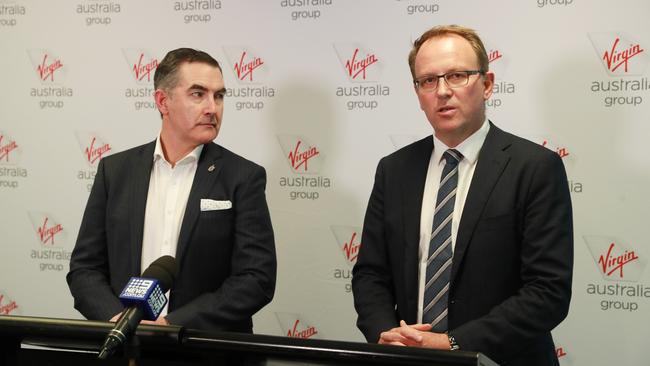Scurrah urges Virgin reboot with 737s
Virgin Australia CEO Paul Scurrah has told prospective buyers of the carrier to concentrate on Boeing 737s.

Virgin Australia CEO Paul Scurrah has told prospective buyers of the carrier the best way forward is to rebuild the business as a domestic airline with a strong frequent-flyer program.
The 20-year-old airline went into voluntary administration on April 20 with debts of $6.8bn, sparking a flood of interest from prospective buyers.
Four bidders were short-listed on Monday including Bain, BGH Capital, Indigo Partners and Cyrus Capital.
In a series of three-hour presentations to two of the bidders on Thursday, with two to follow on Friday, Mr Scurrah outlined how the airline could prosper by ditching its hodgepodge fleet of aircraft for a line-up of Boeing 737s.
The domestic network could be rebuilt from scratch focusing on high-demand, lucrative routes, while international services and low-cost carrier Tigerair would be “optional extras”.
Costly contracts with Wi-Fi providers and caterers would be up for negotiation, presenting opportunities for significant savings.
As Mr Scurrah outlined the possibilities for Virgin 2, administrator Deloitte hosted the first committee-of-inspection meeting with 35 creditor representatives including unions, airports, banks, bondholders and suppliers.
They were told of the increasing urgency for further funding to keep Virgin Australia flying.
With government subsidies for flights due to come to an end on June 11, administrators revealed they were exploring various avenues for financial assistance including state governments and commercial lenders.
Although an existing $100m in cash was expected to see the airline through till the end of July, concern centred on Virgin Australia’s ability to ramp up to keep pace with rival Qantas.
The meeting heard administrators were eyeing up to $238m in restricted cash, tied up against hedging and in merchant and credit card facilities.
Failing that, Deloitte also suggested to the committee one of the final two bidders could enter into some funding arrangement before settlement — precisely the scenario that scared off Brookfield.
It also emerged on Thursday that a group of restructuring experts calling itself Australia Connected Aviation Partners approached Virgin Australia’s administrator last week with a plan they believed best protected the interests of creditors in the administration process.
ACAP is being bankrolled by American entrepreneur Augie Fabela, the co-founder of the New York Stock Exchange-listed VEON, the seventh largest mobile phone operator in the world boasting $US22bn ($33.5bn) in revenues.
Mr Fabela was also the chairman of the Koenigsegg Group, which acquired Swedish vehicle maker Saab more than a decade ago from General Motors.
In the ACAP team are three former EY partners who have started their own turnaround services business known as Spiique, which last year worked with Deloitte’s Vaughan Strawbridge on the rescue of Axsesstoday, a publicly listed SME lender that went into voluntary administration.
Also in ACAP’s ranks is Dermot Mannion — former CEO at Aer Lingus and deputy chairman of Royal Brunei Airlines — and former AMP bank CEO Sally Bruce.
“The concern of our team is that there will be a financial restructure of Virgin done quickly that will disenfranchise creditors who have seen value destroyed. You could end up with a very valuable business that somebody hasn’t had to pay for,’’ said Spiique co-founder David Hewish, noting ACAP had already held discussions with Virgin creditors.
Under its recapitalision plan for the airline, Virgin’s unsecured creditors would be given the option to convert all or a portion of their debt into equity; roll over their debt on a “standstill basis” or elect to receive a cash payment.
New senior notes would be issued together with a potential equity component to investors underwriting the note offering.
“We certainly believe there is room to develop a plan B solution for Virgin. Fixing the business is the missing element in the current process,” Mr Hewish said.
“The current tight timeline doesn’t give the business a chance to work with the stakeholders and come up with a plan.”



To join the conversation, please log in. Don't have an account? Register
Join the conversation, you are commenting as Logout